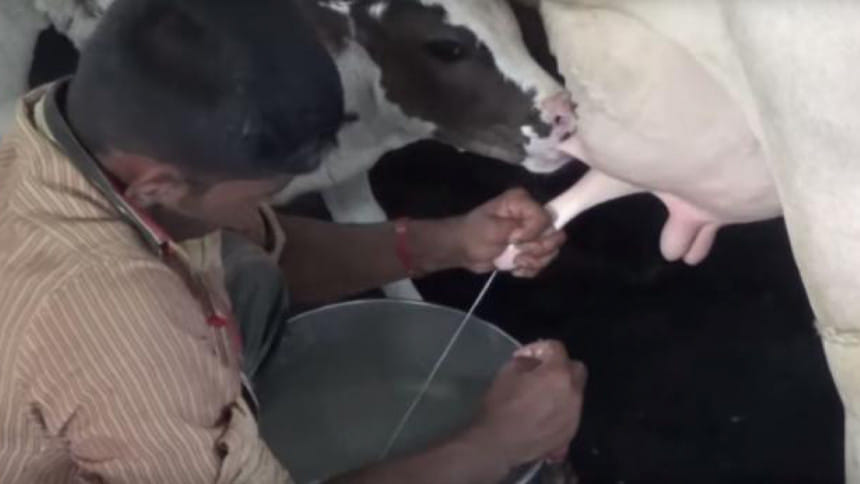Raw Milk, Curd, Fodder: Find if there’s any harmful element

Expressing dissatisfaction at the BSTI for not properly testing raw cow milk, curd and fodder, the High Court yesterday ordered the authorities to test them to identify the quantity of harmful bacteria, chemicals, lead and antibiotics in them. The court directed the Bangladesh Standards and Testing Institution and Bangladesh Food Safety Authority (BFSA) to get the samples of raw cow milk, curd and fodder examined in labs and submit test reports to it by June 23.
Expressing dissatisfaction at the BSTI for not properly testing raw cow milk, curd and fodder, the High Court yesterday ordered the authorities to test them to identify the quantity of harmful bacteria, chemicals, lead and antibiotics in them.
The court directed the Bangladesh Standards and Testing Institution and Bangladesh Food Safety Authority (BFSA) to get the samples of raw cow milk, curd and fodder examined in labs and submit test reports to it by June 23.
The HC said harmful substances were found in raw cow milk, curd and fodder in different tests, but the BSTI was not getting anything unsafe in its test, which is not credible.
“Unsafe substances were found in milk and curd in the tests conducted by International Centre for Diarrhoeal Disease Research, Bangladesh [icddr,b], and the Bangladesh Council of Scientific and Industrial Research [BCSIR] in 2017. But the Bangladesh Standards and Testing Institution is not getting anything harmful. Why is the truth not unearthed in the test of Bangladesh Standards and Testing Institution?” the court asked.
It added that if BSTI officials stayed in the air-conditioned rooms, they would not get the milk, curd and fodder tested accurately.
The bench of Justice Md Nazrul Islam Talukder and Justice KM Hafizul Alam yesterday passed the order and came up with the observations while holding a hearing on a suo moto rule issued by the court on February 11.
On May 15, the same HC bench had directed the BSTI and the BFSA to submit reports detailing the names and relevant particulars of the companies and persons responsible for adulterating raw milk, curd and fodder and the steps taken against them by June 23.
During yesterday’s hearing, Prof Shahnila Ferdousi, head of National Food Safety Laboratory (NFSL), appeared before the court along with the study report her organisation had prepared in February this year.
The report say it has found in raw cow milk excessive levels of lead and pesticides, regular consumption of which is harmful to human health.
When BSTI lawyer Sarker MR Hasan Mamun raised question about the authenticity of the test report prepared by NFSL, Prof Shahnila told the court that the test report was accurate as they examined the samples of raw cow milk, curd and fodder following international standards and published the test report after the results were examined and published by some international organisations.
She added that the NFSL tested the samples of dairy food to build awareness among the people. She also described the method of testing the food.
The lawyer said the NFSL examined the samples of row cow milk from Dhaka, Narayanganj and Savar, but most of the milk is produced in Pabna, Sirajganj, and Jashore and the samples were not collected from there.
Prof Shahnila said dairy products of major brands like Milk Vita, Pran, Arong, Farm Fresh, Shwapno, Aftab Dairy Milk and Igloo are found across the country.
The Icddr,b and the BCSIR had published test reports on the presence of chemicals, antibiotics, and lead in dairy food in 2017, she added.
The HC asked Prof Shahnila to place her statement through swearing an affidavit before this court within a month.
Faridul Islam appeared for BFSA while Deputy Attorney General AKM Amin Uddin Manik represented the state.
On May 14, the HC issued a serious warning saying that the companies and individuals responsible for adulterating milk and curd, whoever they were, would not be spared and they must be punished.
None will be allowed to play ducks and drakes with people’s lives, as safe food is a fundamental right of people, the court said, asking, “How will the nation be built if health of its future generation is not sound?”
On February 11, the HC had ordered the government to form a probe committee to identify the individuals and businesses involved in adulteration of dairy products and fodder.
It also issued a rule asking the respondents, including the BFSA chairman, members of Central Food Safety Management Coordination Committee, and the BSTI chairman, to explain as to why their inaction and failure in preventing adulteration and taking appropriate legal steps against it should not be declared illegal.
The court asked them to show causes why the production, carrying and preserving of adulterated milk, curd and fodder found in shops, departmental stores and open market should not be declared illegal.
The rule asked the respondents to explain as to why they should not be directed to remove such milk, curd and fodder from those places and bring those responsible to book.
The HC bench had come up with the order and rule following reports on adulteration published in The Daily Star, the Prothom Alo and the Kaler Kantha on February 11.
According to The Daily Star report, the NFSL in its study found the presence of excessive levels of lead and pesticides in raw cow milk.
It also found a high level of chromium in fodder.


 For all latest news, follow The Daily Star's Google News channel.
For all latest news, follow The Daily Star's Google News channel. 





Comments